Download VDSL2 Router with 4-Port Ethernet
Transcript
VDSL2 Router with 4-Port Ethernet VDSL2 Router User Manual, Ver. 1.0 Copyright by CTC UNION Communications Inc., all right reserved The information in this document has been checked carefully and is believed to be correct as of the date of publication. CTC UNION Communications Inc. reserves the right to make changes in the product of specification, or both, presented in this publication at any time without notice. CTC UNION Communications assumes no responsibility or liability arising from the specification listed herein. CTC UNION Communications make no representations that the use of its products in the manner described in this publication will not infringe on existing or future patents, trademark, copyright, or rights of third parties. Implication or other under any patent or patent rights of CTC UNION Communications Ins. Grants no license. All other trademarks and registered trademarks are the property of their respective holders. CTC Union Technologies Co., Ltd. Far Eastern Vienna Technology Center (Neihu Technology Park) 8F, No. 60, Zhouzi St. Neihu, Taipei, 114 Taiwan Phone: +886-2-2659-1021 FAX: +886-2-2799-1355 User Manual Version 1.0 April 2013 (Revised) This document is the current official release manual. Please check CTC Union's website for any updated manual or contact us by E-mail at [email protected]. Please address any comments for improving this manual or to point out omissions or errors to [email protected]. Thank you. Page: 1 VDSL2 Router User Manual, Ver. 1.0 Tables of Contents CHAPTER 1 INTRODUCTION ................................................................................................................................ 4 1.1 FEATURES ...................................................................................................................................................... 4 1.2 SPECIFICATION ................................................................................................................................................ 5 CHAPTER 2 HARDWARE INSTALLATION ............................................................................................................... 7 2.1 FRONT PANEL ......................................................................................................................................................... 7 2.2 REAR PANEL ........................................................................................................................................................... 8 CHAPTER 3 CONFIGURATION .............................................................................................................................. 9 3.1 LOGIN ................................................................................................................................................................... 9 3.2 HOME ................................................................................................................................................................. 11 3.3 WIZARD............................................................................................................................................................... 12 3.4 VDSL2 ................................................................................................................................................................ 15 3.5 NETWORK ............................................................................................................................................................ 20 3.5.1 Hostname ............................................................................................................................................ 20 3.5.2 Interface .............................................................................................................................................. 21 3.5.3 DNS ...................................................................................................................................................... 22 3.5.4 DHCP.................................................................................................................................................... 22 3.6 ADVANCE ............................................................................................................................................................. 23 3.6.1 Switch .................................................................................................................................................. 23 3.6.2 Bandwidth ........................................................................................................................................... 24 3.6.3 VLAN .................................................................................................................................................... 24 3.6.3.1 Tag-Base ..........................................................................................................................................................25 3.6.3.2 Port-Base ......................................................................................................................................................... 27 3.6.4 Route ................................................................................................................................................... 28 3.6.5 QoS ...................................................................................................................................................... 29 3.6.5.1 Port Based Priority ..........................................................................................................................................30 3.6.5.2 VLAN Tag Priority ............................................................................................................................................32 3.6.5.3 IP DSCP Priority ...............................................................................................................................................33 3.6.5.4 TCP UDP Priority..............................................................................................................................................34 3.6.6 DDNS ................................................................................................................................................... 36 3.6.7 IGMP.................................................................................................................................................... 36 3.7 SECURITY ............................................................................................................................................................. 37 3.7.1 Firewall ................................................................................................................................................ 37 3.7.2 MAC Filter............................................................................................................................................ 40 3.7.3 IP Filter ................................................................................................................................................ 41 3.8 MANAGEMENT ..................................................................................................................................................... 43 Page:2 VDSL2 Router User Manual, Ver. 1.0 3.8.1 SNTP .................................................................................................................................................... 43 3.8.2 SNMP .................................................................................................................................................. 44 3.8.3 Telnet................................................................................................................................................... 45 3.9 STATUS ................................................................................................................................................................ 46 3.9.1 VDSL2 .................................................................................................................................................. 46 3.9.2 WAN .................................................................................................................................................... 47 3.9.3 Route ................................................................................................................................................... 47 3.9.4 DHCP Client ......................................................................................................................................... 48 3.9.5 Switch .................................................................................................................................................. 48 3.10 INFORMATION .................................................................................................................................................... 49 3.10.1 System ............................................................................................................................................ 49 3.10.2 System Log ..................................................................................................................................... 50 3.11 UTILITY ............................................................................................................................................................. 51 3.12 REBOOT ............................................................................................................................................................ 53 Page: 3 VDSL2 Router User Manual, Ver. 1.0 Chapter 1 Introduction CTC UNION VDSL2 Router is a single-VDSL2-port router with 4 10/100Mbps Ethernet ports. With the latest VDSL2 technology (ITU G.922.3), it delivers the extraordinary bandwidth and supports up to VDSL2 profile 30a; and, it is perfectly suitable for triple play applications (video, voice and data). VDSL2 Router is a cost effective solution and delivers high-speed Internet access to end-users over existing copper wire infrastructure. Also, it is designed to meet the requirements of ISPs and carriers that intend to use one DSL device to cover end users in different loop range areas. In addition, it provides a great flexibility for their end-users to comply today’s rapid-changing Internet demands. Based on the latest VDSL2 technology, VDSL2 Router presents a cost-effective solution with a high-speed Internet access over a standard copper telephone cable. 1.1 Features Support point-to-point mode (support both CO and CPE modes). High interoperability with major VDSL chipset companies, such as, Ikanos, Infineon, and Broadcom, etc. Build-in VDSL2 modern with a support up to VDSL2 profile 30a. Supports up to 100Mbps for both Upstream and Downstream. Build-in UPnP available, which allows automatic discovery and the Broadband Router’s configuration. IP/MAC addresses filtering. Static route/RIP/RIP v2 routing functions Support QoS to enhance traffic efficiency. Support NAT, which allows multiple users access the Internet with only one single external IP address. IGMP Proxy and fast leave. DNS Proxy. Embedded SNMP agent. Web-based management with a friendly graphical user interface. Configuration backup and restoration. Page:4 VDSL2 Router User Manual, Ver. 1.0 1.2 Specification VDSL2 standards Compliant with ITU VDSL2 standard G.993.2 Annex A, Annex B and Annex C Support VDSL2 profile: 8a, 8b, 8c, 8d, 12a, 12b, 17a and 30a Band plan profile: symmetric (Plan 997) and asymmetric (Plan 998) Management Web-based GUI for quick setup, configuration and management Firmware upgradable from Web SNMP management with SNMP agent and MIB II LAN Filtering functions for MAC/IP/Port. Port Based VLAN & IEEE 802.1q VLAN Tagging Port configuration for Bandwidth/Duplex/Speed/Flow control. QoS Port Based 802.1p ToS/DSCP 4-level priority queue per port WRR/WFQ/SP/BE Routing Static routing and RIP v1/v2(RFC 1058/2453) Support IP/TCP/UDP/ARP//IGMP IGMP snooping and proxy (RFC 1112/2236) NAT ALGs for ICQ/NetMeeting/MSN/Yahoo Messenger DNS relay and caching (RFC 1034/1035) DHCP server IP precedence (RFC 791) (Firewall router) Firewall DMZ host/Multi-DMZ/Multi-NAT function Virtual server mapping (RFC1631) VPN pass-through for PPTP/L2TP/IPSec tunneling Natural NAT firewall User access control Indicators General : PWR and SYS WAN(VDSL2) : CO, CPE, LINK and ALM LAN (Ethernet) : 1,2,3,4 LNK/ ACT Page: 5 VDSL2 Router User Manual, Ver. 1.0 Interfaces Ethernet: 4 x RJ-45 connectors for Ethernet 10/100Mbps ports with Auto-MDI/MDIX. VDSL: 1 x RJ-11 connector for VDSL2 port. Physical/Electrical Power: 100~240VAC (via power adapter) Power consumption: 9 watts maximum. Temperature: 0~45°C Humidity: 0%~95%RH (non-condensing) * CTC UNION reserves the right to change specifications without prior notice. All brand names and trademarks are property of their respective owners. All rights reserved. Page:6 VDSL2 Router User Manual, Ver. 1.0 Chapter 2 Hardware Installation This chapter shows the front panel and how to install the hardware. 2.1 Front Panel Please see the graphic below for the front panel: Front panel can be separated into six parts from left to right: (1) Power (2) System (3) Central Office (4) Customer Premises Equipment (5) Link (6) Alarm LED Status of VDSL2 Router: Blinking On Off PWR Power On Power Off SYS SYM ASYM CO CO Mode On CPE CPE Mode On LINK Activity Connected Slow: Start Connection Fast: Data Transmit ALM Connection Error Page: 7 VDSL2 Router User Manual, Ver. 1.0 2.2 Rear Panel The rear panel of VDSL2 Router is where all of the connections are made. Connectors Description of VDSL2 Router DC-IN Power adaptor inlet: Input voltage 12VDC LAN (1,2,3,4) Four Ethernet10/100BaseT auto-sensing and auto-MDI/MDIX for Ethernet ports(RJ-45) PHONE Telephone port (RJ-11) DSL VDSL2 interface for WAN port (RJ-11). RESET The reset button, the button restore the default setting when press this button until reboot Page:8 VDSL2 Router User Manual, Ver. 1.0 Chapter 3 Configuration 3.1 Login There is no software required to install in order to access your web controller, and all you need is a web browser. To login your management system, please open any browser, such as, Internet Explorer, Firefox, etc., and go to “http://192.168.1.1” (Note: If you had changed the IP address, please login into the modified IP address). You should be able to open the management web page as the following image. The default user name and password are “root” and “root”. Please key in the user name and the password and click on “Submit” button to login. Once the authorization process is complete, the web page will be re-directed to the main page as the following image. The main page will show the real-time status of the VDSL2 router as the major content. On the left hand side, there is a menu section, which allows users to setup the settings of VDSL2 router. Page: 9 VDSL2 Router User Manual, Ver. 1.0 The VDSL2 router supports various features. In addition, it sorts all features into 11 sections, as the followings: 1. Home Return to the main page. 2. 3. 4. 5. 6. 7. 8. 9. Wizard Quick setup wizard VDSL2 For setting up the details of VDSL2 Network For setting up the details of network interfaces Advance Other detail setups, such as, VLAN and QoS, etc. Security Security features, such as, firewall, etc. Management Management function, such as, SNMP, etc. Status For monitoring the status of VDSL2 router. Information For presenting the system information and logs. 10. Utility Utility tools, such as, upgrade firmware and restore the factory defaults, etc. 11. Reboot Page:10 VDSL2 Router User Manual, Ver. 1.0 3.2 Home Click on “Home” on the menu section to load the main page. The real-time status of VDSL2 router will be showed the main page. Page: 11 VDSL2 Router User Manual, Ver. 1.0 3.3 Wizard “Wizard” is the quick setup function, which will guide the users to setup the VDSL2 router step by step. Step 1. Choose VDSL2 mode: CPE or CO. the VDSL2 router. Then, click “Next” to continue setting up Step 2. Choose the system mode: Bridge or Router. Then, click on “Next” to continue the following steps or “Previous” to go back the previous step. As a Bridge mode: If you choose to setup the VDSL2 router as a bridge modem, then, the setup process is completed; hence, the following confirmation will be showed. Page:12 VDSL2 Router User Manual, Ver. 1.0 Click on “Apply” to save the setups. Click on “Previous” to go back the previous step. As a Router modem: Choose “Router” in step 2 and click on “Next” to go to step 3. Step 3. Setup the details of WAN interface. WAN Protocol: “Fixed IP” or “PPPoE” IP address Net Mask Gateway IP Then, click on “Next” to confirm the setups. Page: 13 VDSL2 Router User Manual, Ver. 1.0 While applying the new setups, you should be able to see the following image. When the setup process is complete, you will be able to see the following image. Page:14 VDSL2 Router User Manual, Ver. 1.0 3.4 VDSL2 “VDSL2” function allows you to setup the detailed VDSL2 parameters. CPE Mode: Operating Mode: CPE (RT) or CO (COT) You are able to change the operating mode as a CPE device or a CO device here. Profile Enabled: 8a, 8b, 8c, 8d, 12a, 12b, 17a, and 30a G.hs Carrier Set: Auto, A43, B43 and V43 This parameter is for setting up ITU-T G.994.1 (G.hs) Handshake Procedures for Digital Subscriber Line (DSL) Transceiver rule. Carrier Set Upstream Carrier Set Downstream Carrier Set Designation Transmission Mode Frequency Maximum Power Frequency Maximum Power Indices (N) Level/Carrier (dBm) Indices (N) Level/Carrier (dBm) A43 9 17 25 -1.65 40 56 64 -3.65 Duplex Only B43 37 45 53 -1.65 72 88 96 -3.65 Duplex Only V43 944 972 999 -16.65 257 383 511 -3.65 Duplex Only G.994.1 – Carrier Sets for the 4.3125 kHz Signaling Family Page: 15 VDSL2 Router User Manual, Ver. 1.0 xDSL Recommendation(s) Carrier Set Designation G.992.1 – Annex A, G.992.2 – Annex A/B, A43 G.992.3 – Annex A/I/L, G.992.4 – Annex A/I G.992.5 – Annex A/I G.992.1 – Annex B, G.992.3 – Annex B G.992.5 – Annex B B43 G.993.1 – Using multi-carrier modulation (except Annex C) V43 G.994.1 – Mandatory Carrier Sets CO Mode: Operating Mode: CPE (RT) or CO (COT) You are able to change the operating mode as a CPE device or a CO device here. Profile Enabled: 8a, 8b, 8c, 8d, 12a, 12b, 17a, and 30a G.hs Carrier Set: Auto, A43, B43 and V43 This parameter is for setting up ITU-T G.994.1 (G.hs) Handshake Procedures for Digital Subscriber Line (DSL) Transceiver rule. Profile Adaptation: Disable or Enable Page:16 VDSL2 Router User Manual, Ver. 1.0 Adaptation Length: Default value: 3800 Range: 1500 ~ 3900 Band Profile: Default value: A_R_POTS_D-32_EU-32 Options: Annex Type Options A_R_POTS_D-32_EU-32 Annex A A_R_POTS_D-64_EU-64 B8-1_998-M1x-A B8-2_998-M1x-B B8-3_998-M1x-NUS0 Annex B B7-1_997-M1c-A-7 B8-4_998-M2x-A B7-2_997-M1x-M-8 B8-5_998-M2x-M B7-3_997-M1x-M B8-6_998-M2x-B B7-4_997-M2x-M-8 B8-7_998-M2x-NUS0 B7-5_997-M2x-A B8-8_998E17-M2x-NUS0 B7-6_997-M2x-M B8-9_998E17-M2x-NUS0-M B7-9_997E17-M2x-A B8-10_998ADE17-M2x-NUS0-M B7-10_997E30-M2x-NUS0 B8-11_998ADE17-M2x-A B7-1_997-M1c-A-7 B8-12_998ADE17-M2x-B B7-2_997-M1x-M-8 B8-13_998E30-M2x-NUS0 B8-14_998E30-M2x-NUS0-M B8-15_998ADE30-M2x-NUS0-M B8-16_998ADE30-M2x-NUS0-A C_POTS_25-138_b Annex C C_POTS_25-276_b C_TCM-ISDN C_TTC-JJ-100 VDSL2 Band Plan Options This option is for setting up VDSL2 band plan. Note: The connection status of data rate and distance will be different with different combinations of profiles. ADSL Friendly: Default value: No No, 1.1MHz, or 2.2MHz Page: 17 VDSL2 Router User Manual, Ver. 1.0 MIB Parameters: This section is to setup other VDSL2 parameters for both Upstream and Downstream. Target SNR: Default value: 6dB Range: 6dB to 24dB This option is to set up the target SNR value, which means the SNR value of the connection will be equal to higher than the target SNR value. If the SNR value is lower than the target SNR value, then, the VDSL2 router will try to lower the data rate and maintain the SNR value. Maximum Rate Limit: Default value: 101Mb/s Range: 1Mb/s ~ 101Mb/s This field is to setup the maximum data rate of upstream/downstream. INP Symbol (30a): Default value: 3-symbol Range: no-protection, 1-symbol ~ 16-symbol This option is to setup INP level for VDSL2 30a Profile. INP Symbol (non-30a): Default value: 2-symbol Range: no-protection, 1-symbol ~ 16-symbol This function is for setting up INP level for other VDSL2 Profiles, except 30a. Maximum Interleave Delay: Default value: 8ms Range: no limit, no delay, 1ms ~ 63ms The value is to setup the maximum interleave delay of upstream/downstream. Rate Adaptation Mode Default value: DynamicRa Options: Manual, RaInit, and DyanmicRa This mode is to decide the rate adaptation mode. Mode Manual Description No rate-adaptation. The initialization process attempts to synchronize to a specified rate. RaInit Rate-adaptation during initialization process only. The mode will attempts to synchronize to a rate between minimum and maximum Page:18 VDSL2 Router User Manual, Ver. 1.0 specified value. DynamicRa Dynamic rate-adaptation during the initialization process as well as during SHOWTIME. Rate Adaptation Mode and Definition The following setups are for defining the details of “Rate Adaptation Mode” for Upstream and Downstream. Up Shift SNR Margin Default value: 70 To define the SNR margin for rate upshift. Up Shift Time (seconds) Default value: 3600 To setup the minimum time for rate upshift. Down Shift SNR Margin Default value: 50 To define the SNR margin for rate downshift. Down Shift Time (seconds) Default value: 3600 To setup the minimum time for rate downshift. Page: 19 VDSL2 Router User Manual, Ver. 1.0 3.5 Network “Network” section is for setting up the necessary parameters for a network interface. The details of “Network” function includes: Hostname Interface DNS DHCP 3.5.1 Hostname “Hostname” is the name of the device for others to identify the device in a computer network. Page:20 VDSL2 Router User Manual, Ver. 1.0 3.5.2 Interface “Interface” section is for defining LAN interface and WAN interface. In this section, you are allowed to reset the operation mode of the VDSL2 router as “Bridge” or “Router”. The followings are the details you are allowed to modify in “Interface” section. Mode Bridge or Router MTU The maximum transmission unit size Default value: 1500 Default Gateway LAN IP Address Net Mask WAN (Router Mode only) Protocol DHCP, Static IP or PPPoE IP Address Net Mask Gateway Page: 21 VDSL2 Router User Manual, Ver. 1.0 3.5.3 DNS The VDSL2 router allows users to save two DNS servers as “Primary Server” and “Secondary Server”. 3.5.4 DHCP The VDSL2 router supports DHCP server only. You are allowed to enable or disable DHCP function of the router. The followings are the details of DHCP function. Mode: Off or Server Pool Off or On The followings will be showed when the mode of “Pool” is ON. Subnet IP Netmask IP Range Start IP Range End Gateway IP DNS IP Lease Time (mins) Page:22 VDSL2 Router User Manual, Ver. 1.0 3.6 Advance In “Switch” section, you are allowed to setup further details, such as the followings: 3.6.1 Switch Bandwidth VLAN Route QoS DDNS IGMP Switch You are able to change the individual duplex mode for each Ethernet port in VDSL2 router. Therefore, you are able to modify the mode in “Switch” section. The options of the mode are as the followings: Auto 100M-Full 100M-Half 10M-Full 10M-Half Page: 23 VDSL2 Router User Manual, Ver. 1.0 3.6.2 Bandwidth “Bandwidth” section is where you can setup the bandwidth control for each Ethernet port. Mode: Off or On TX N value 0: no limit 1 ~ 3124: the value of N Data rate is N * 32kbps RX N value 0: no limit 1 ~ 3124: the value of N 3.6.3 Data rate is N * 32kbps VLAN VDSL2 router supports two VLAN techniques: Tag-Base and Port-Base. You are allowed to change VLAN policy of the router by choosing the mode in “VLAN” section. Mode: Off: disable VLAN function. Tag-Base: Port-Base: Enable VLAN function with Tag-Base technique. Enable VLAN function with Port-Base technique. Page:24 VDSL2 Router User Manual, Ver. 1.0 3.6.3.1 Tag-Base There are 16 rules allowed in “Tag-Base” VLAN. For each policy, you can choose which LAN port or WAN port should be included in the rule by clicking on the corresponding checkboxes. Check the checkbox to choose the group member VID VLAN ID The VLAN ID is for checking a tagged ingress packet and see whether the VLANs are matched or not. If yes, allow the ingress packet to access the VLAN group members. If no, deny the access. PVID VLAN ID When receiving a un-tagged ingress packet, add PVID into the packet Page: 25 VDSL2 Router User Manual, Ver. 1.0 according to the corresponding port and check whether there is any VLAN rule matched with this PVID. If yes, allow the access; otherwise, deny the access. TAG Mode: Un-tag: remove the VLAN ID of an egress packet. Tag: add VID into an ingress packet. Page:26 VDSL2 Router User Manual, Ver. 1.0 3.6.3.2 Port-Base You are able to setup maximum of 6 VLAN rules in “Port-Base” mode. TPID (Tag Protocol Identifier) Default value: 33024 (0x8100) Range: 33024 ~ 37120 (0x8100 ~ 0x9100) Note: The value of TPID is in decimal format. Port Base Mode Un-tag: no tag will be added into an egress packet. Tag: add a tag into an egress packet. (Note: the tag includes TPID and VLAN ID. You are not allowed to change VLAN IDs in Port-Base. VLAN IDs are the default values.) Page: 27 VDSL2 Router User Manual, Ver. 1.0 3.6.4 Route “Route” function allows you to build up the static routing table. Click on “Append” button to show the detail setups. Destination IP Netmask Gateway Interface LAN or WAN Page:28 VDSL2 Router User Manual, Ver. 1.0 3.6.5 QoS Four popular QoS methods are supported in VDSL2 router. Port Based Priority VLAN Tag Priority IP DSCP Priority TCP UDP Priority You are able to choose which methods you want by clicking on the desired method on “Mode” area. A detailed menu will be showed according to the selected method. The following sections will introduce the QoS techniques this VDSL2 router support. Page: 29 VDSL2 Router User Manual, Ver. 1.0 3.6.5.1 Port Based Priority “Port Based Priority” method is to assign a priority queue for ingress packets and send out packets based on the priority sequence. Scheduling Configuration There are 4 priority queues for Port Based Priority QoS function. Each queue will be assigned with a scheduling method, such as, SP, BE, WRR or WFQ. You are not allowed to set the scheduling method for the priority queue. All priority queues are assigned with a particular scheduling method by default. The VDSL2 router provides 3 different combinations of scheduling methods. Combinations: Type 1: Queue 0: WRR, Queue 1: WRR, Queue 2: WRR, Queue 3: WRR Type 2: Queue 0: BE, Queue 1: WFQ, Queue 2: WFQ, Queue 3: WFQ Type 3: Queue 0: BE, Queue 1: WFQ, Queue 2: WFQ, Queue 3: SP Page:30 VDSL2 Router User Manual, Ver. 1.0 WRR Configuration For assigning the weight of each priority queue. (Note: 8 is the highest.) WFQ Configuration For assigning the data rate of each priority queue. Port Based Priority For assigning a port with a designated priority queue. Page: 31 VDSL2 Router User Manual, Ver. 1.0 3.6.5.2 VLAN Tag Priority “VLAN Tag Priority” will sort all ingress packets according to the priority of VLAN tag and store all the packets into the assigned priority queues. “VLAN Tag Priority” adopts the same setup styles as “Port Based Priority”, except the last setup, “VLAN Tag Priority”. VLAN Tag Priority For assigning a priority to a queue. The value of priority is based on the priority in VLAN tag. Priority Page:32 VDSL2 Router User Manual, Ver. 1.0 3.6.5.3 IP DSCP Priority “IP DSCP Priority” method is to assign ingress packets with the priority queues based on the DSCP value of IP packet header. “Scheduling Configuration”, “WRR Configuration” and “WFQ Configuration” are same as these in “Port Based Priority”. IP DSCP Priority For assigning a priority queue to each bit of IP DCSP. Page: 33 VDSL2 Router User Manual, Ver. 1.0 3.6.5.4 TCP UDP Priority “TCP UDP Priority” method is to assign the priority queue according to the port number. Same as “Port Based Priority”, you need to setup “Scheduling Configuration”, “WRR Configuration” and “WFQ Configuration” first. Then, the following three setup sections are the major setup for “TCP UDP Priority” method. Logical Port Type Disable Source Logical Port: If the source port number is matched, then, apply the following rule. Destination Logical Port: If the destination port number is matched, then, apply the following rule. Source or Destination Logical Port: If either the source port number or the destination port number is matched, then, apply the following rule. Page:34 VDSL2 Router User Manual, Ver. 1.0 Pre-define Logical Port Number 4 rules can be set in this section. Mode Disable: disable the rule Enable: enable the rule Port: the port number Queue: the priority queue User Define Logical Port Range 2 rules are available in this section Mode Disable or Enable From: the starting point of the port range To: the last acceptable port number Queue: the priority queue Page: 35 VDSL2 Router User Manual, Ver. 1.0 3.6.6 DDNS “DDNS” (Dynamic DNS) is support in VDSL2 router. the DNS table among two listed providers. Mode: Off or On Provider: the DNS service provider Hostname Username Password 3.6.7 This function allows you to update IGMP VDSL2 router supports “IGMP Snooping” function by simply enable this feature. “IGMP Snooping” is a feature that allows a network switch to listen IGMP conversation between hosts and routers and maintains a map of which links require IP multicast streams. Page:36 VDSL2 Router User Manual, Ver. 1.0 3.7 Security “Security” section allows you to enhance the connection security. The section consists of 3 major functions. 3.7.1 Firewall MAC Filter IP Filter Firewall “Firewall” function includes firewall feature and DoS protection feature. In addition, you are allowed to create 8 security rules. Mode: Firewall Function Off or On Page: 37 VDSL2 Router User Manual, Ver. 1.0 Protection: DoS Protection Off (disable DoS protection), Low, Medium, and High Low Invalid TCP Flags Xmas Tree Scan Null Scan TCP Sync Flood UDP Flood ICMP Flood Invalid Session Block Medium Items in “Low” UDP Netbios Attack TCP Netbios Attack IP Spoofing Block HTTP Session High Items in both “Low” and “Medium” Echo Scan Chargen Scan Smurf DoS Attack NetBus Attack Back Orifice Attack NetSpy Attack Priority Attack Pass Ripper Attack Senna Spy Attack Striker Attack Subseven Attack Inikiller Attack Block Telnet Session Protection Levels Page:38 VDSL2 Router User Manual, Ver. 1.0 Security Rules (01 ~ 08) Click here to change the other rule set. Mode Off: disable the security rule. On: enable the security rule. Action Filter: to setup the rule as a filter, therefore, the option is associated with “Source IP” and “Destination IP”. Policy: to limit the bandwidth; therefore, this option is associated with “Bandwidth”. Bandwidth Source IP Destination IP Protocol UDP or TCP Source Port Destination Port Page: 39 VDSL2 Router User Manual, Ver. 1.0 3.7.2 MAC Filter “MAC Filter” is where you are able to setup an access list based on MAC addresses. Mode Off: to disable MAC Filter function On: to enable MAC Filter function Policy Deny or Permit Entry 01 ~ Entry 16 Mode Off: to disable the rule On: to enable the rule Action Deny: to deny the access of the specified MAC address. Permit: to allow the access of the specified MAC address. MAC Address The target MAC address. Page:40 VDSL2 Router User Manual, Ver. 1.0 3.7.3 IP Filter “IP Filter” function will deny or allow different types, such as, ICMP, TCP and UDP, of packets from the range of assigned IP addresses. Mode: Off: to disable IP filter function On: to enable IP filter function Policy Deny Permit Page: 41 VDSL2 Router User Manual, Ver. 1.0 Entry 01 ~ Entry 16 Mode Off: to disable the entry On: to enable the entry Action Deny Permit Protocol All, ICMP, TCP, and UDP Source IP The source IP address Source Mask The source sub net mask From Source Port The first port number in a range of port numbers for the source IP To Source Port The last port number among the range for the source IP Destination IP The destination IP address Destination Mask The destination sub net mask From Destination Port The first port number in a range of port numbers for the destination IP To Destination Port The last port number among the range for the destination IP Page:42 VDSL2 Router User Manual, Ver. 1.0 3.8 Management The VDSL2 router supports 3 remote management features: SNTP SNMP Telnet You are able to access and manage the router remotely. 3.8.1 SNTP “SNTP” function allows you to setup the web site where you would like to synchronize the time this router modem. Mode: Off or On Time Server: the web site where you would like to synchronize the time Time Zone Page: 43 VDSL2 Router User Manual, Ver. 1.0 3.8.2 SNMP “SNMP” function is to setup the passwords for connecting your SNMP server. By doing so, you are able to monitor this VDSL2 router via SNMP server. (Note: VDSL2 router supports SNMPv2c.) Mode: Off or On Community Mode: Off or On Community The password to access SNMP server. Access Access right: “Read only” or “Read & Write” Page:44 VDSL2 Router User Manual, Ver. 1.0 3.8.3 Telnet “Telnet” function is to enable the access of telnet. able to access the VDSL2 router via telnet. Mode: Off or On Port: the access port Note: if the mode is “Off”, you will not Page: 45 VDSL2 Router User Manual, Ver. 1.0 3.9 Status “Status” section allows you to monitor the status of the router. You are able to check the following status: VDSL2 WAN Route DHCP Client Switch 3.9.1 VDSL2 “VDSL2” function is for monitoring the VDSL2 connection. there will be different information displayed. For CO and CPE modems, CO CPE Page:46 VDSL2 Router User Manual, Ver. 1.0 3.9.2 WAN “WAN” page will show the information of WAN interface, such as: Mode IP Address Network Mask Link (link status) 3.9.3 Route “Route” presents the routing table. table. You are able to review the status of the routing Page: 47 VDSL2 Router User Manual, Ver. 1.0 3.9.4 DHCP Client 3.9.5 Switch “Switch” function shows the current status of each Ethernet port. Page:48 VDSL2 Router User Manual, Ver. 1.0 3.10 Information “Information” section presents 2 major information. 1. System 2. System Log 3.10.1 System “System” function shows all the details of the VDSL2 router. (Note: this page is important when you request technical assistance. Please make sure you provide the image of “System” page.) The information includes: Software Version MAC Serial NO MCSV Current Time System Up Time Page: 49 VDSL2 Router User Manual, Ver. 1.0 3.10.2 System Log “System Log” presents the important events of the VDSL2 router during its run-time. Page:50 VDSL2 Router User Manual, Ver. 1.0 3.11 Utility “Utility” section includes the important tools for you manage the VDSL2 router. It includes: Upgrade Backup Restore Page: 51 VDSL2 Router User Manual, Ver. 1.0 Default Ping Traceroute Page:52 VDSL2 Router User Manual, Ver. 1.0 3.12 Reboot “Reboot” function is for rebooting the VDSL2 router without turning off the power supply. Page: 53 REVISION HISTORY DATE VERSION 2013/12/13 1.0 December 2013 2014/4/11 (Revised) 1.0 CONTENTS Change the interface pictures (front panel & rear panel) Change product photo in web

























































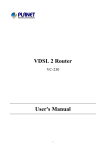

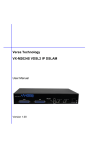
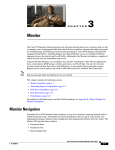




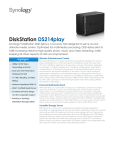
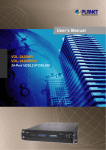
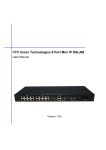





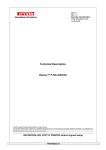

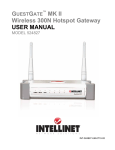
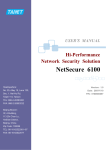
![Fio 2.0 UM ECU [ENG]](http://vs1.manualzilla.com/store/data/005638068_1-6dee15c8bb797972f1fa6aeeeee54189-150x150.png)
